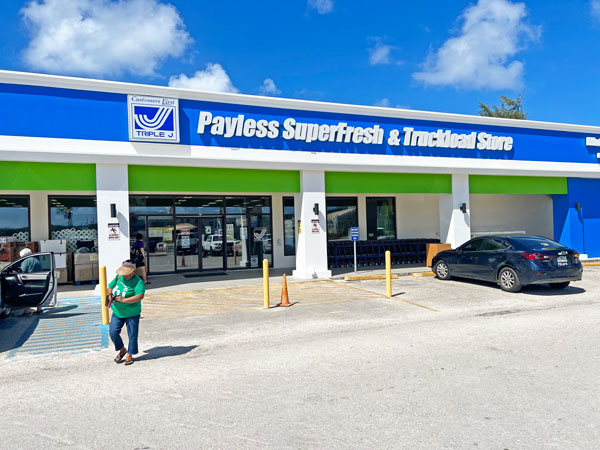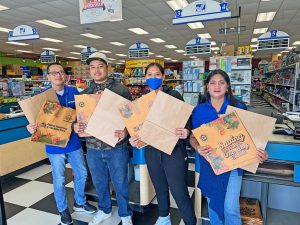Payless says no to single-use plastic bags

Payless SuperFresh & Truckload Store in Chalan Kanoa no longer carries single-use plastic bags starting last Jan. 1. (MARK RABAGO)
Payless SuperFresh & Truckload Store is giving Mother Nature a solid after deciding at the start of the year to completely remove single-use plastic bags.
General manager Jay Santos said Payless SuperFresh & Truckload Store’s decision to ditch single-use plastic bags was a conscious effort and came down from the top brass of Triple J. Enterprises, Inc.
“It’s our way of getting greener and helping the environment. We’re such a small island and it’s always a sad sight to see plastic bags proliferating everywhere,” he said.
In lieu of single-use plastic bags, the Chalan Kanoa store is making available brown paper bags and reusable bags made from durable biodegradable materials as substitutes at a minimum cost to customers.

Payless SuperFresh & Truckload Store retail manager Alex Camacho, left, poses with staff while showing off brown paper bags and reusable bags made from durable biodegradable materials.(MARK RABAGO)
Santos said Triple J and Payless SuperFresh & Truckload Store could no longer wait for local legislation to compel businesses like them to switch from single-use plastic bags to more greener alternatives, adding that if Palau and Guam can do it, so can the CNMI.
Store retail manager Alex Camacho said he’s glad that Payless SuperFresh & Truckload Store got rid of single-use plastic bags.
“We’re just trying to promote saving the environment because right now when you go to the beach every weekend you see all these plastics lying around. We need to protect our fish and other wildlife on the beach.”
He added that SuperFresh & Truckload Store is the first on island to do this and it’s been a real struggle to push it to customers, but they do try to educate them that in the long run it’s better for the environment.
Camacho said since outlawing the use of single-use plastic bags at the start of the year, the only plastic bags they’ve been using inside the store are the small cellophane-like ones used for produce and meats to prevent cross contamination.
Staff Fatima Monterubio echoed Camacho when she said customers at first were shocked when they learned that they don’t use single-use plastic bags anymore.
“They usually ask us ‘why are we doing this?’ But after explaining to them it’s for the environment, they usually come to understand,” she said.
SuperFresh & Truckload Store sells the big reusable picnic bags made of disposable material for $6.99, the blue reusable bags for 99 cents, and the brown paper bags for 25 cents and 10 cents for the big and small sizes, respectively.
In 2019, the Plastic Bag Bill, or Senate Bill 21-37, was introduced in the Senate. It seeks to prohibit the importation and production of single-use plastic bags in the CNMI four months after its enactment, and would bar businesses from providing single-use plastic checkout bags a year after its enactment.
Two years later in 2021, House Bill 22-56 or the Eco-Friendly Act of 2021 was introduced in the House of Representatives. Under the bill, a $1 plastic bag fee was proposed for those not using a reusable bag in their trips to grocery stores. Both bills were never enacted.























